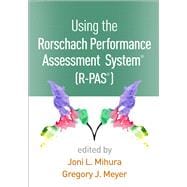From codevelopers of the Rorschach Performance Assessment System (R-PAS), this essential casebook illustrates the utility of R-PAS for addressing a wide range of common referral questions with adults, children, and adolescents. Compelling case examples from respected experts cover clinical issues (such as assessing psychosis, personality disorders, and suicidality); forensic issues (such as insanity and violence risk assessments, child custody proceedings, and domestic violence); and use in neuropsychological, educational, and other settings. Each tightly edited chapter details R-PAS administration, coding, and interpretation. Designed to replace the widely used Comprehensive System developed by John Exner, R-PAS has a stronger empirical foundation, is accurately normed for international use, is easier to learn and use, and reduces ambiguities in administration and coding, among other improvements. Visit www.r-pas.org for more information.








